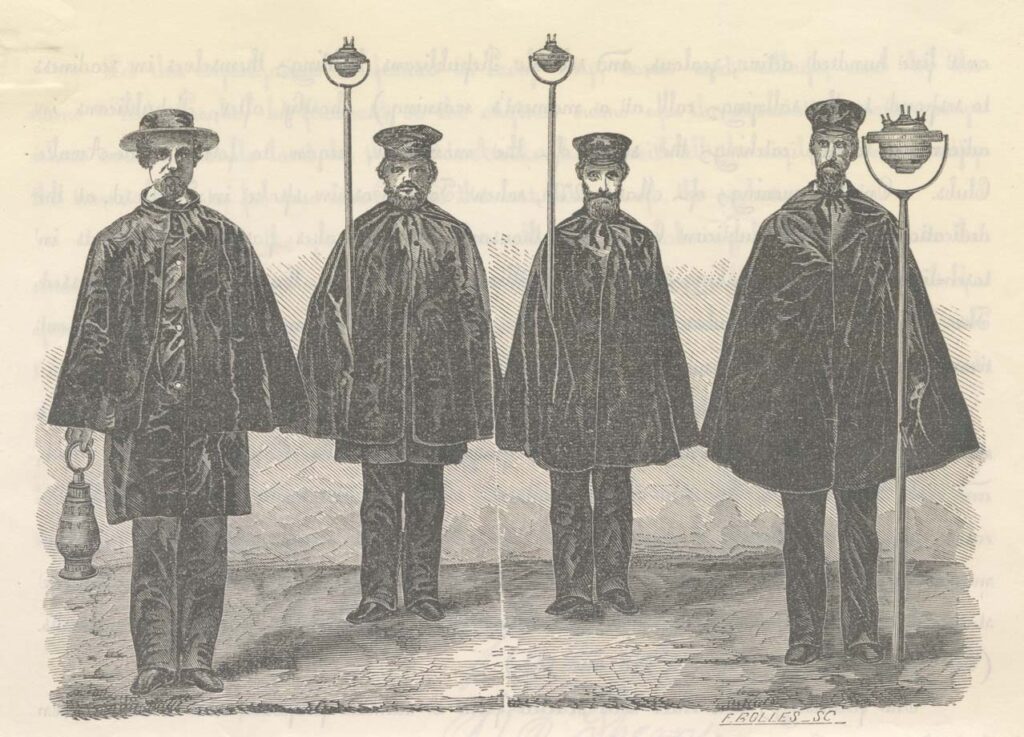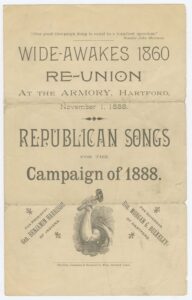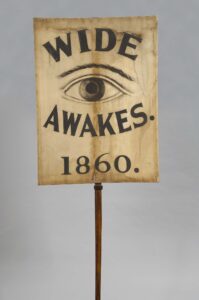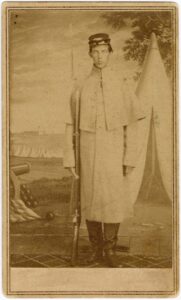Written by Clare Nelson
In 1860, one year before the American Civil War, a group of young Connectican men formed a political campaign group in Hartford called the Wide Awakes. In just eight months, their 36-man club would become a movement. From coast to coast, Wide Awakes would go to great lengths to support the election of the Republican presidential candidate, Abraham Lincoln. Their enthusiastic, public support of Lincoln gained them a national reputation and influenced the course of American history.
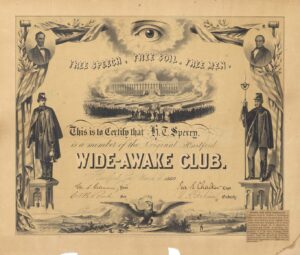
Henry Sperry’s Wide Awakes membership certificate, Hartford, March 3, 1860. Connecticut Museum collection, broadsides, medium 1860 F853w.
Leading up to the presidential election of 1860, slavery was the central issue. As a party, Democrats fought for the expansion of slavery into new territories and states. On the other side, members of the relatively new Republican party fought to prevent its spread. Connecticans were also divided. Some fiercely fought to abolish slavery, while others worked to prevent it from spreading to new territories and states. Some did not have any problems with slavery.
The Origin of the Wide Awakes
On a February evening in 1860, over one thousand men and women gathered in Hartford to hear Cassius Clay, an anti-slavery Republican from Kentucky, give a speech to kick off Connecticut’s gubernatorial race. The Hartford Courant quoted him saying “no greater responsibility ever rested on men than rests upon you now, ye men of Connecticut.”
Five young clerks from Talcott and Post, a dry goods store in Hartford, did not hear Clay’s speech that evening, but they did join the parade that escorted Clay back to his hotel. Edgar S. Yergason, Charles R. Hart, Charles Fairbanks, and brothers Daniel G. and James L. Francis dressed in identical caps and oilcloth capes and carried oil-fueled torches for the occasion. Their collective, uniformed look caught the eye of Republican organizer George Bissell, who was trying to wrangle the crowd. He motioned for them to lead the parade.
What began as friends having a good time led to the creation of a nation-wide political movement. On March 3, 1860, just days after Clay’s speech, the five clerks gathered 31 of their peers in a small, one-room apartment to form the Republican Wide Awakes of Hartford, a political organization to support the Republican party.
Why “Wide Awakes”?
Terms like “Wide Awake,” “Be Awake,” and “Awaken” were frequently used by individuals and newspapers, like the Hartford Courant, as a call to action. Republicans and Democrats alike encouraged supporters to see through the lies of political opponents and fight against them. Republicans in particular urged Northerners to stand up to the Southern enslavers who had control of the federal government.
At the Wide Awakes founding meeting, merchant tailor H.P. Hitchcock was inspired by an article in the Hartford Courant. The newspaper described a recent meeting of Republicans as Wide Awake, and Hitchcock suggested that they call themselves the Wide Awakes.
Values of the Wide Awakes
The 36 original members, many not even old enough to vote in 1860, quickly drafted a constitution. The preamble outlined the key values and goals for the Wide Awakes. First, they would spread the values and beliefs of the Republican party and would work to secure the election of Republican candidates. They declared their complete devotion to the US Constitution and Union. They also stated that they resisted the spread of slavery but did not want to interfere with slavery where it already existed.
The Spread of the Movement
The Wide Awakes motivated people across the United States to take action and support Lincoln’s campaign. Wide Awakes clubs formed throughout Connecticut, New England, and further west to Illinois and even California. Henry Sperry, a secretary of the Hartford club, received so many letters asking how to start a club that he had a circular printed. It had blanks for the date and inquirer’s name that he could quickly fill in before sending it off. While clubs adopted the public, militaristic structure of the original Wide Awakes, they each put their own spin on the details. Some had colored capes; others created their own chants or altered the constitution to meet their needs. By the time of the 1860 presidential election, which Lincoln won, an estimated 100,000 to 200,000 Wide Awakes rallied across the nation.
Across the nation, women supported Wide Awakes movement by attending parades, preparing food for formal banquets, and presenting the men with ceremonial flags and torches. Some, including a group of young women from East Chatham, New York and the famous women’s rights activist Elizabeth Cady Stanton, even formed their own Wide Awakes clubs. In the many ways they participated, these women demonstrated that voting—from which they were excluded—was not the only way to be active in politics.
Although none have been identified in Connecticut, as many as 250 Black Wide Awakes marched in clubs across the country. They faced intense racism, including from white members of the organization. Lewis Hayden, formerly enslaved and a leader in the Boston abolitionist movement, formed the first all-Black Wide Awakes club—the West Boston Wide Awakes. In Oberlin, Ohio, the presence of lawyer John Mercer Langston, likely the first Black Wide Awake, sparked controversy when he spoke to white Wide Awake audiences and marched with the Oberlin club. Some, like Langston, did not support Lincoln, but hoped the Wide Awakes movement would advance the cause of abolition.
Taking Action
From the beginning, the Wide Awakes uniformed look and very public and active approach to campaigning made them unique and attracted many members. They frequently organized torch-lit parades, during which they marched, chanted, and sometimes violently clashed with opposing crowds. They escorted Republican candidates and speakers to and from events. They used Lieutenant Colonel William J. Hardee’s Rifle and Light Infantry Tactics to regularly perform military drills and handed out ballots and monitored polls on election days as voters publicly cast their votes. As the movement grew, Wide Awakes clubs hosted banquets.
After the Presidential Election
The Wide Awakes’ showy and public support drew national attention to Lincoln’s campaign. After his election, Lincoln thanked the Wide Awakes for their support but requested that they not show up to his inauguration in uniform. He saw their militaristic zeal as a liability and did not want to give the South any reason to think he was trying to start a war.
When the Civil War began, many Wide Awakes exchanged their torches for rifles to continue to fight for the Republican cause. An estimated three out of four Wide Awakes joined the military. For decades after the Civil War, they gathered for parades and banquets as they continued to campaign for Republican candidates under the Wide Awakes name.
Clare Nelson is an exhibit developer at the Connecticut Museum of Culture and History.





